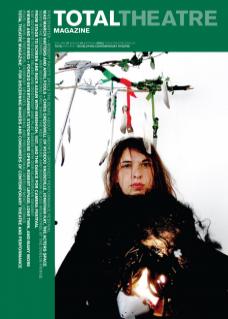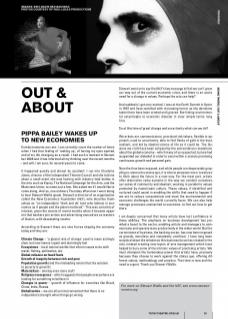Eureka moments are rare. I can certainly count the number of times when I had that feeling of ‘waking up’, of having my eyes opened, and of my life changing as a result. I had such a moment in November 2008 and it has informed all my thinking over the recent months – and will, I am sure, for several years to come.
It happened quietly and almost by accident: I ran into Charlotte Jones, director of the Independent Theatre Council and she told me about a small event she was hosting with industry lead bodies in the arts such as Equity, The National Campaign for the Arts, and the Musicians Union, to name just a few. She asked me if I would like to come along. And so, one ordinary Thursday afternoon I went along to hear Stewart Wallis speak. Stewart is director of an organisation called the New Economics Foundation (NEF), who describe themselves as “an independent ‘think and do’ tank who believe in economics as if people and the planet mattered”. This was certainly of interest, given the events of recent months when it became apparent that bankers join artists and advertising executives as masters of illusion, with devastating results.
According to Stewart there are nine forces shaping the economy today and they are:
Climate Change – ‘a glacial rate of change’ used to mean achingly slow, but now means urgent and alarmingly fast
Ecosystems – local natural worlds that inform issues to do with water, fishing, pollination, etc
Global reliance on fossil fuels
Growth of inequity between rich and poor
Population growth (and the misleading notion that the solution to poverty is growth)
Materialism – owning even more stuff
Religious resurgence – which suggests that people everywhere are looking for something to believe in
Changes in power – growth of influence for countries like Brazil, China, India, Russia
Globalisation – we are all so interconnected that there is no independent strength when things go wrong
Stewart went on to say that NEF’s key message is that we can’t grow our way out of the current economic crisis, and there is an acute need for a change in values. Perhaps the arts can help?
And suddenly I got very excited. I was at the Earth Summit in Kyoto in 1997 and have watched with increasing horror as the decisions taken there have been eroded and ignored. But linking environmental catastrophe to economic disaster in clear simple terms rang true.
So at this time of great change and uncertainty what can we do?
We artists are communicators, practiced risk takers, flexible in approach, used to uncertainty, able to find flecks of gold in the dust, resilient, and led by idealist visions of life as it could be. The illusions we craft have been eclipsed by the extraordinary revelations about the global economy – which many of us suspected, but we had suspended our disbelief in order to exist within a society promising continuous growth and personal gain.
Now that has been exposed, and while people are desperately grappling to restore the status quo, it is time to empower more ‘creatives’ to think about the future in a new way. For the most part, artists offer alternative value systems in the way we conduct ourselves, our sense of community and idealism, working in parallel to values promoted by mainstream culture. These values, if identified and nurtured could assist in enabling the shifts that need to happen if we are to reduce consumerism and meet the environmental and economic challenges the world currently faces. We can also help manage processes unattached to outcomes: to find out how to get there.
I am deeply concerned that many artists have lost confidence in these abilities. The emphasis on business development has provided a boost to the sector, enabling artists and managers to communicate and operate more productively in the wider world. But the cornerstone of business, the banking sector, has now been exposed as greedy, merciless and completely unethical. I have long been sceptical about the imbalance this business focus has created in the arts, instead creating new layers of arts management which have helped to bury some of the intrinsic values of practising artists. We must champion the tremendous power that artists have, precisely because they choose to work against the status quo, offering different values, methodology and practice. That time is now and the need is urgent. Thank you Stewart Wallis.
For more on Stewart Wallis and the NEF, see www.neweco- nomics.org

